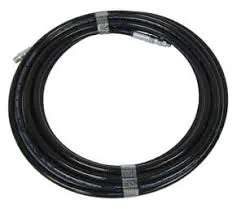Understanding Brake Fluid Line Essentials and Maintenance Tips for Vehicle Safety
Understanding Brake Fluid Lines A Critical Component of Vehicle Safety
When it comes to vehicle maintenance, many car owners focus on the engine, tires, and exterior aesthetics, often overlooking a crucial aspect of automotive safety the brake fluid line. This component plays an essential role in a vehicle's braking system, and understanding its function, maintenance, and potential issues is vital for ensuring safe driving.
The Function of Brake Fluid Lines
Brake fluid lines, known as brake lines, are vital conduits that transport brake fluid from the master cylinder to the brake calipers or wheel cylinders at each wheel. When you press the brake pedal, the master cylinder generates hydraulic pressure by pushing the brake fluid through these lines. This pressure activates the braking mechanism, allowing the vehicle to slow down or come to a complete stop. Given their role, it is imperative that brake lines are functioning correctly.
Most brake lines are made from steel or a flexible material such as rubber, with steel lines typically used for the majority of the run due to their durability and resistance to damage. Rubber hoses are often used in areas that require flexibility to accommodate suspension movement. While these materials are designed to withstand high pressure, exposure to moisture, road salt, and environmental factors can cause degradation over time.
Common Issues with Brake Fluid Lines
Brake fluid lines can encounter several problems, which may compromise the safety of the vehicle. One of the most common issues is corrosion, particularly in steel lines. Corrosion can lead to rust formation, which weakens the structural integrity of the line and can eventually result in leaks. This is particularly prevalent in regions with harsh winters where road salt is frequently used.
Another potential issue is the development of leaks in the rubber hoses. Over time, these hoses can dry out, crack, or wear out due to heat exposure, causing brake fluid to seep out. Leaks diminish the hydraulic pressure necessary for effective braking, leading to a spongy brake pedal feel, reduced braking efficiency, and, in severe cases, complete brake failure.
brake fluid line

Air trapped within the brake lines is another concern. When brake fluid is low due to leaks or improper maintenance, air can enter the system, leading to a reduction in braking power. The presence of air results in a spongy brake pedal, which can be alarming for drivers, indicating that immediate inspection is necessary.
Maintenance of Brake Fluid Lines
Regular maintenance of brake fluid lines is crucial for vehicle safety. One of the key aspects of maintenance involves periodically checking the brake fluid level and ensuring it is within the manufacturer’s recommended range. Brake fluid is hygroscopic, meaning it absorbs moisture over time, which can lead to water contamination and decreased boiling point. It is advisable to change the brake fluid according to the manufacturer's recommendations or every two years as a general rule.
Visual inspections can also help identify worn or damaged brake lines. Look for signs of corrosion on steel lines or cracking and swelling in rubber hoses. If any issues are noted, replacing the affected line or hose promptly is essential to prevent more significant problems down the line.
It's also essential to bleed the brakes periodically. This process removes air that may have infiltrated the system and ensures that the brake fluid is free from moisture. While some car owners may perform this task themselves, it is often advisable to have a professional handle it to ensure it is done correctly.
Conclusion
In summary, brake fluid lines are a critical component of any vehicle’s braking system. Their proper function is essential for safe operation, and neglecting their maintenance can have severe consequences. By understanding the importance of brake fluid lines and taking proactive steps to maintain them, vehicle owners can enhance their safety on the road. Regular inspections, fluid changes, and addressing any issues promptly can help ensure that your vehicle's braking system performs effectively, providing peace of mind for every journey.
-
Ultimate Spiral Protection for Hoses & CablesNewsJun.26,2025
-
The Ultimate Quick-Connect Solutions for Every NeedNewsJun.26,2025
-
SAE J1401 Brake Hose: Reliable Choice for Safe BrakingNewsJun.26,2025
-
Reliable J2064 A/C Hoses for Real-World Cooling NeedsNewsJun.26,2025
-
Heavy-Duty Sewer Jetting Hoses Built to LastNewsJun.26,2025
-
Fix Power Steering Tube Leaks Fast – Durable & Affordable SolutionNewsJun.26,2025

